Home » Articles posted by Paul Gerald Williams
Author Archives: Paul Gerald Williams
Exeter Students Interview ‘Rafiki’ filmmaker Wanuri Kahiu
The Kenyan film Rafiki was released in the UK this month, and three of our students (Ben Apea, Aysha Taylor, and Molly West) recently interviewed director Wanuri Kahiu for the Africa in Words blog. Rafiki was banned by the Kenyan Film Classification Board for (in the words of its chief executive) “its clear intent to promote lesbianism” – then unbanned for seven days, then banned again. Ben, Aysha, and Molly are taking the module African Narratives, run by my colleague Dr Kate Wallis, and the interview was one of their assessments on the module – good job folks!
Student Photo Competition
Hello All!
Teaching came to an end last Friday and everyone is satisfied a good term’s work has been completed. We will be blogging a little less regularly over the coming months and this post is a chance to pay tribute to some of our first year’s budding photographers…
I set my first-year seminar groups a competition to take a photograph of their favourite thing on campus: it could be a view, a tree, a seat in the library, anything they wanted really. Here are the winners:
FIRST PRIZE: Harry Whattoff (BA English)
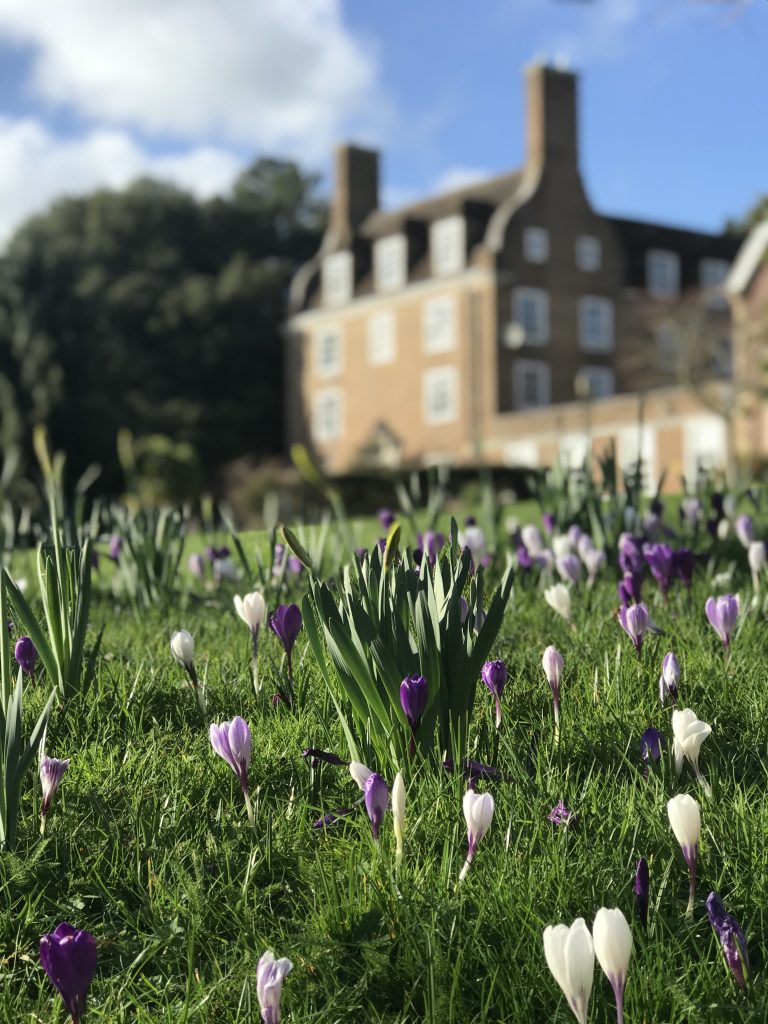
JOINT SECOND PLACE: Kate Debling (BA English) and Name Withheld
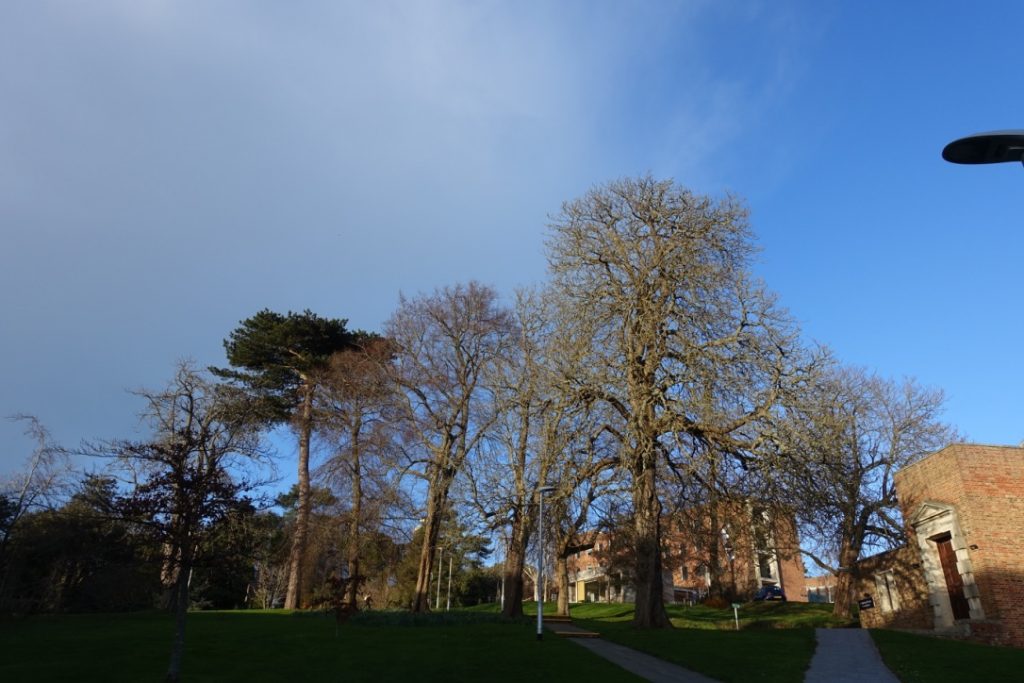
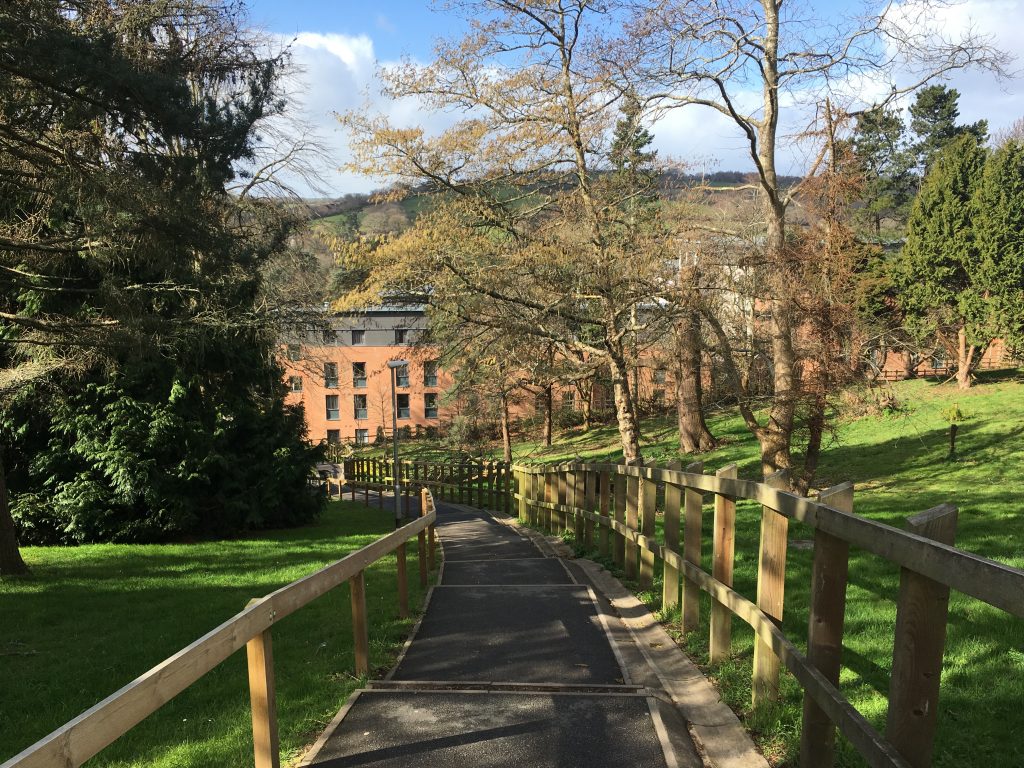
Some very impressive efforts – well done all!
Many thanks to everyone who came along to an Offer-Holder Visit Day over the last two months, we hope you enjoyed your time on campus and learnt more about our degree programmes in the Department of English & Film. You can still ask us questions about English at Exeter, we’d be happy to help!
Adventures in Theatreland (Devon’s Theatreland, that is)
It’s a special post this week focusing on the University of Exeter’s rich variety of drama clubs, theatre production companies, and performing arts societies! As you can see, whether it’s writing your own play, developing your production skills, or standing in front of the spotlight, there are all sorts of opportunities to take part in student theatre, on and off campus.
Kicking us off, playwright and performer Emily Reader (BA English), who is in her final year:
During my time at Exeter, I’ve been lucky enough to try my hand at a wide range of theatre societies in multiple capacities. One of the biggest is Footlights, a society specialising in large musical theatre productions. I have so far done two shows with them as a cellist in the band – My Fair Lady and Oklahoma! – with the latter being performed in the Northcott, our local professional theatre. Both shows have been highlights of my university experience. It is immensely rewarding to put on shows of incredibly high standards with talented students who also have their own degrees to do!I was also the cellist for an original musical, Sherwood, based on the story of Robin Hood. This was in partnership with Shotgun, the more niche musical theatre society, and Theatre With Teeth, which specialises in original student theatre. Theatre With Teeth subsequently put on a play I wrote last summer which then toured to a drama festival in Glasgow. All of these societies have gifted me unforgettable experiences that have transformed my time at Exeter. I have become obsessed with theatre and as a consequence have decided to pursue writing professionally and cello in a more amateur capacity in the future.

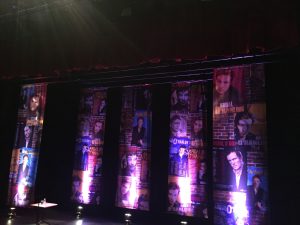

I’m an American student studying English and Drama, and know how intimidating it can be trying to enter a new theatre community. Within the first few weeks at Exeter, all the societies had their auditions in the same building. The hallway was completely hectic, as students rehearsed monologues to themselves and queued up to show their talents. It was a lot to take in, and I ended up just bouncing from room to room, trying anything and everything, until I had auditioned throughout the entire hallway, and was completely ready to fall into bed. But as I was leaving, I saw a familiar name on a door downstairs, a room separate from all the rest. “Auditions: Tennessee Williams’ Summer and Smoke”. It was the last thing I expected to see at student auditions in England, and even though I was exhausted, I knew I had to give my go at Williams. I never thought my first Southern gothic drama would take place in Exeter, England, alongside a cast of Brits, but I cannot be more thankful for my experience. It’s the only show I got a callback for, and I think it was fate that I stumbled upon Annie Bunce’s little audition room before heading out. Over the next couple months, I would spend my nights rehearsing with a talented bunch of actors, all the while making amazing friends and becoming familiar with British culture. I fell in love with the writing of Tennessee Williams because of Annie, who fell in love with him after seeing a production of Summer and Smoke in London. I was able to make Exeter feel like home by finding my own little theatre community.
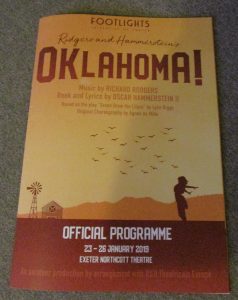
Field Trip!
We take every opportunity to knit our teaching into the resources available on campus and within the city of Exeter. A case in point is the Level 2 module Renaissance and Revolution: Seventeenth-Century Literature!
Below are some photographs from the mid-term field trip led by my colleagues Dr Jo Esra and Dr Ayesha Mukherjee. Speaking to the major theme of Renaissance and Revolution, this outing centred on the relationship between literature and local history during the Civil War. Exeter reflected the political turmoil and schisms of the period: the city was divided between royalists and parliamentarians and Exeter was twice besieged by royalist forces (it was eventually recaptured by Thomas Fairfax and parliament’s New Model Army in 1646). Exeter’s Civil War left behind a wealth of written evidence that students read before the field trip, such as pamphlets, news reports, sermons, declarations, and legal documents, including the writings of Robert Herrick and Thomas Fuller, two churchmen active in the area.
Outside Exeter Cathedral the students (and Jo) get ready for the learning to begin…
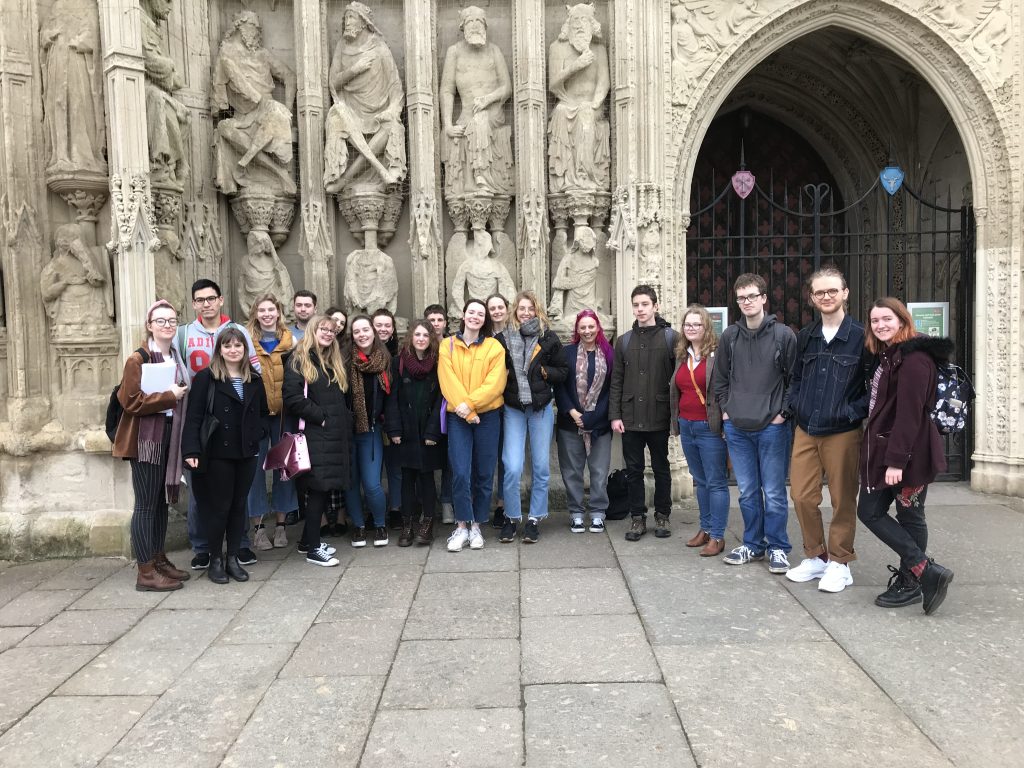
The field trip took in a variety of historic sites around the city…
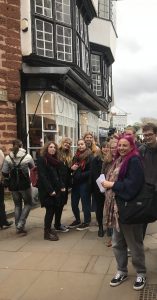
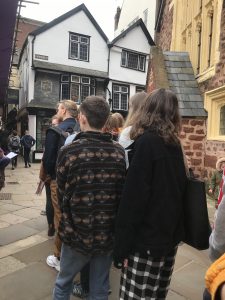
…before heading into Exeter Cathedral…
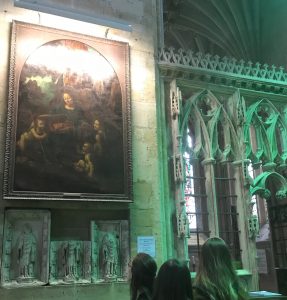
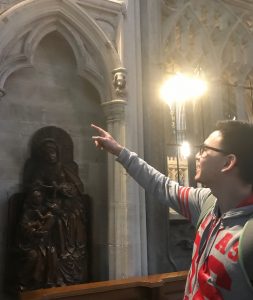
…where the students examined evidence of iconoclasm:
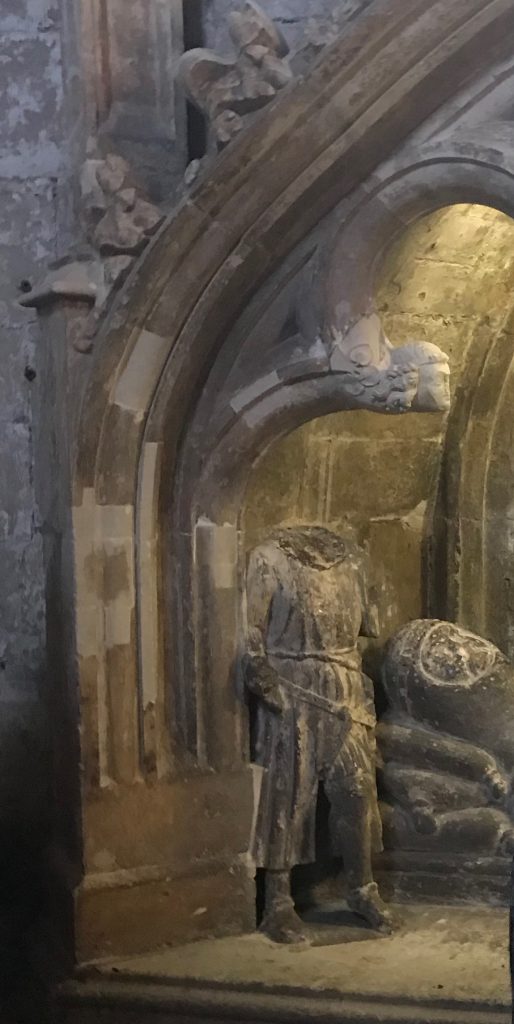
I wish I had gone myself, especially to see the cathedral’s medieval cat flap:
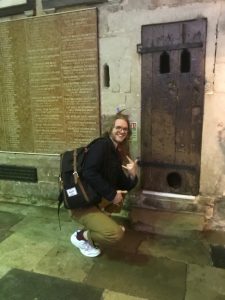
And courtesy of the Exeter Cathedral Twitter feed, here it is in action!

Mukoma Wa Ngugi and The Rise of the African Novel
This week the Department of English & Film hosted a talk by Cornell University’s Mukoma Wa Ngugi on the subject of his latest book, The Rise of the African Novel (2018). Mukoma talked about the historical exclusion of African authors who don’t write in English and the cultural costs of assuming that English is the language of aesthetic writing. As a result of this assumption, there is an incomplete archive of literary works written in African languages.
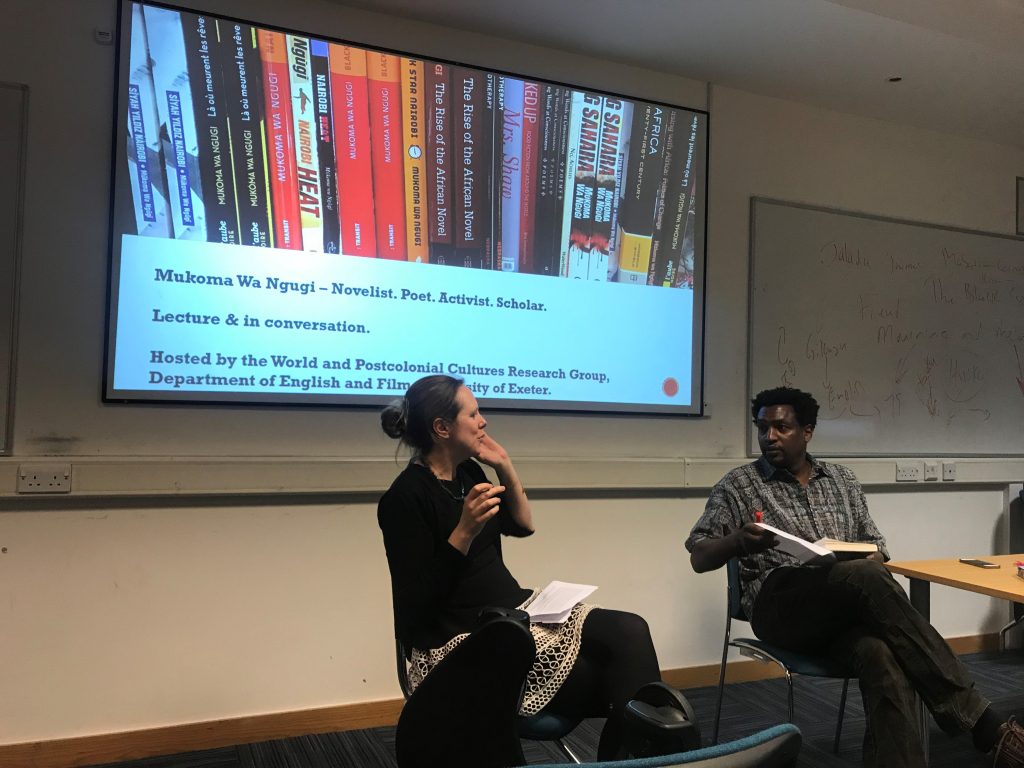
Mukoma in conversation with Dr Kate Wallis, Lecturer in Global and World Literatures
The English programme at Exeter has seen several new modules offered in the last few years so that students can study a wide range of world literature on their degree. Second-year undergraduates can take Culture, Crisis and Ecology in a Postcolonial World, which introduces students to how texts from around the globe inscribe the social, historical and environmental impact of colonialism and new forms of imperialism. In the final year students can choose Acts of Writing: From Decolonisation to Globalisation as well as specialist options such as:
- India Uncovered: Representations in Film and Fiction (this module investigates how filmic and fictional texts articulate the legacy of India’s colonial past, its postcolonial present, and diasporic experiences)
- Resource Fictions: Oil, Water and Conflict in the World-System (considering theories of world literature, postcolonial ecocriticism and world-ecology, this module invites students to examine contemporary hydro- and petro-fictions across film, poetry, and the novel)
- Encountering the Other in Medieval Literature (this module explores cross-cultural encounters and focuses on the literature of the twelfth through fifteenth centuries)
- African Narratives (which introduces students to the range and dynamism of narratives produced by African authors from 1960 to today, including online fiction)
And if you are thinking about starting an MA in September, we offer a Pathway in World and Postcolonial Cultures on our MA English Literary Studies too!
Off to Paris
The University of Exeter has a huge array of student societies covering sports, art, music, performance, film… you name it, and there is probably a society for it (yes, there IS a Hide and Seek Society).
Most relevant for the Department of English & Film, there is an English Society. In recent years they have arranged field trips, balls, talks, Christmas dinners, quizzes… you can see more info on their Facebook page.
The students certainly seem to enjoy the annual weekend break to a European city. This year it was Paris! Cue literature-themed photo opportunity:
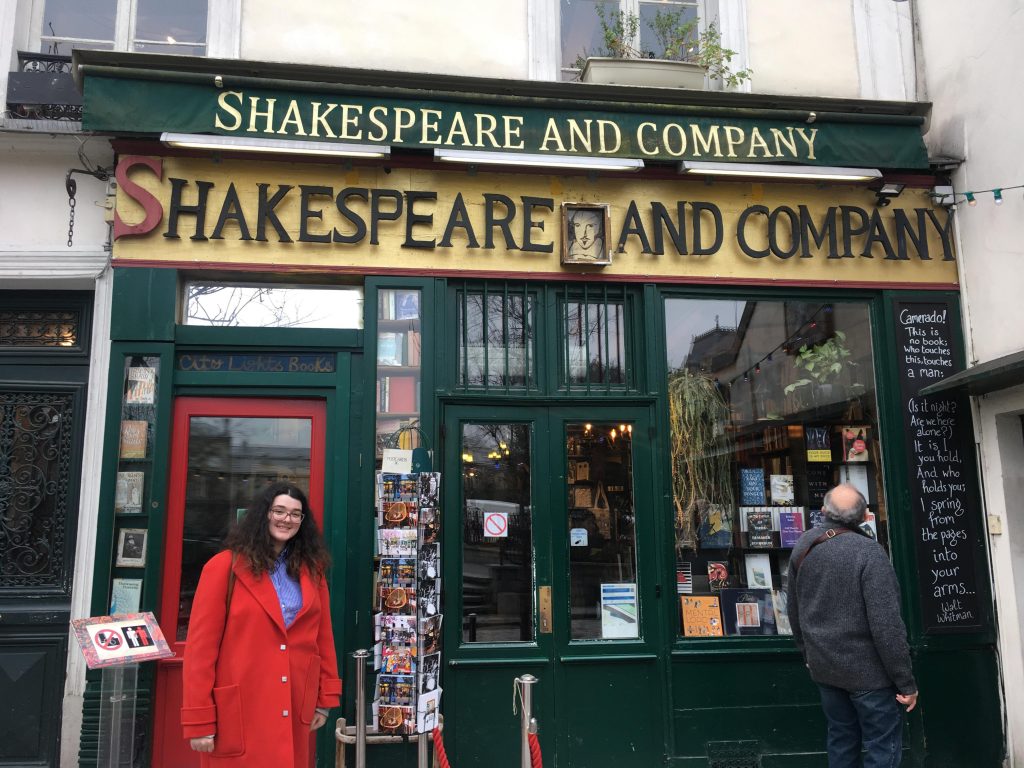
Here is first-year student Mary Helafi outside the bookshop Shakespeare and Company, where James Joyce’s Ulysses was published for the first time in its entirety in 1922. Which seems like a good opportunity to mention that my colleague Professor Vike Martina Plock convenes a third-option focusing on Joyce’s Ulysses. I didn’t make Mary visit Shakespeare and Company just so I could mention Vike’s Ulysses module – honest!
Beckett at Exeter
The novelist, short story writer, and dramatist Samuel Beckett (1906-1989) was awarded the Nobel Prize for Literature in 1969 and he remains centrally important to our understanding of twentieth-century literature and its aftermaths.
Beckett appears in several places on our English BA degree. By my count, his work features on at least four modules, and I teach his Fizzle 6 on a second-year critical theory module entitled Humanities After the Human.
This is hardly a surprise, since we have some of the world’s best Beckett scholars at Exeter! Dr John Bolin‘s Beckett and the Modern Novel inserts the writer into the tradition of the modern European novel.
Another of my colleagues Dr Beci Carver researches and teaches Beckett, especially his novel Watt, which features in her book Granular Modernism.
And to end (yet again, as Beckett might say) Beckett is also a major presence in the work of my colleague Professor Laura Salisbury, who wrote her first book on Beckett and humour. She was talking about him on Radio 4 last month and you can listen to what she said here.
I was tempted to call this post something like ‘Beckseter.’ Aren’t you glad I spared you that!
The Year of the Pig
Today the University of Exeter celebrated Chinese New Year with a festival presented by the Chinese Student Scholars Association. I caught the parade as it started down the High Street…
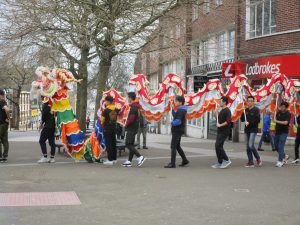
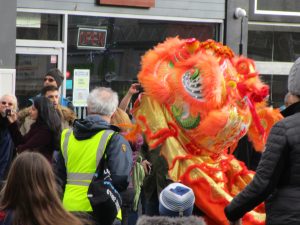
… and then there was Dragon and Lion traditional dancing in front of Exeter Cathedral!
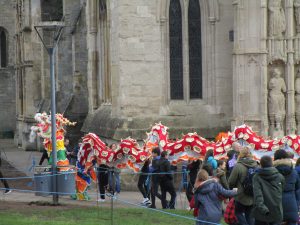
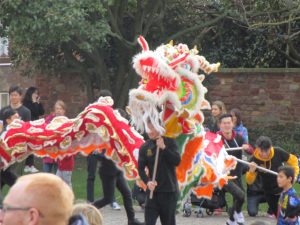
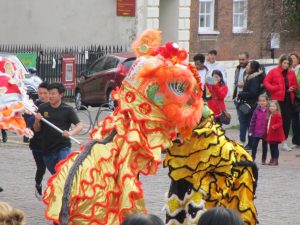
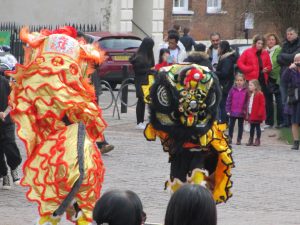
The parade continued through the city centre and onto campus, where more events were planned for the rest of the day.
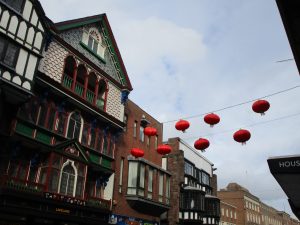
At Exeter we’re committed to thinking about culture in a global context and seeing the parade reminded me of the Department of English & Film’s connections to Chinese performance, art, and literature! Here are just three examples:
My colleague Professor Nick Kaye has extensive research links with Chinese researchers and cultural institutions and one of his new projects involves engaging new urban audiences with traditional Chinese opera via digital mediation; Nick is working with Shanghai All-Female Yue Opera, the only all-female Chinese opera.
Professor Regenia Gagnier has just published a book entitled Literatures of Liberalization: Global Circulation and the Long Nineteenth Century which is centred on two of Regenia’s big interests: the global history of liberalism as a concept and the migration of literary texts around the world. Where the latter is concerned, Regenia has tracked the planetary circulation of decadent literature and the novels of Charles Dickens. China regularly features in her thinking and she has written about how both literature and liberalism have been translated, adapted, and negotiated in modern China.
Finally, Professor Corinna Wagner specializes in the relationship between art, literature, disease, and the body, and regularly writes about medical illustrations during the eighteenth and nineteenth centuries. Corinna is also interested in global circulation and her publications include an article comparing Joseph Towne collection of anatomical waxes with the Lam Qua paintings of the patients of medical missionary Peter Parker. Corinna is giving the sample lecture at this Wednesday’s Offer-Holder Visit Day and I imagine medicine and the body will come up again!
Enter the Bill Douglas Cinema Museum…
The University of Exeter is blessed with many unique archival resources that we integrate into our teaching: Victorian periodicals, writers’ papers, collections of historical documents, and over the course of the term I’ll say a bit about them all. Today I am going to spotlight the treasure trove of popular culture history that is the Bill Douglas Cinema Museum, which never ceases to inspire us and our students!
The BDCM contains the sorts of items you would expect in a museum devoted to the cinema: old filmmaking equipment, ephemera (e.g. postcards, cigarette cards, toys) relating to major movie stars such as Charlie Chaplin and Marilyn Monroe, posters and programmes for film showings, original cel artwork from Disney films, fan magazines, and documents that used to belong to filmmakers (the Lumière brothers, for instance).
But the BDCM also covers hundreds of years of the moving image! So it has significant collections of panorama, magic lantern slides, stereoscopes, kaleidoscopes, and peep shows. These are an invaluable resource for students who are reading eighteenth- and nineteenth-century literature: we can see for ourselves the objects and experiences being described by novelists and poets. These materials also provide a rich insight into the history of popular visual culture, running right up to the era of the cinema!
Myself and my colleague Dr Sinéad Moynihan were doing some teaching in the BDCM recently. This was on an MA module called The Literature of Cold War America and the particular topic that week was the blacklist and the anti-communist witch-hunts of mid-century America. We covered a lot of different texts in the seminar, such as the BDCM’s collection of 1950s books and pamphlets that investigated whether or not the film industry really had been infiltrated by communist subversives.
We started by thinking about the African-American performers, writers, and political activists under FBI surveillance during the 1950s. To this end, we looked at the material from the BDCM relating to Paul Robeson, the singer prevented from leaving the country in 1950; later that year he started a political newspaper entitled Freedom. One item in the BDCM collection is the souvenir programme for Robeson’s 1958 UK tour – which he undertook as soon as his passport was restored. The students also read short stories by the writer Alice Childress and thought about their different publication contexts (e.g. how the stories published in Freedom in 1951 compared to their republication in The Baltimore Afro-American in 1956).
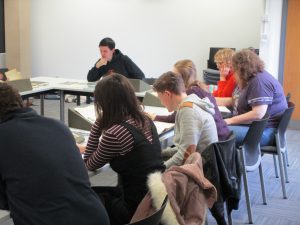
Here are the students looking at film fan magazines, lobby cards, movie posters, and postcards relating to Marlon Brando, star of the 1954 film On the Waterfront. We discussed what Brando’s celebrity and acting style might say about the United States in the 1950s, torn between swaggering confidence and deep-seated anxiety.
The BDCM offers students the opportunity to volunteer and gain experience of working in the museum sector and modules such as British Screens have curatorial activities built into them. You can see the display cases that students have put together as soon as you enter! If you’re visiting Exeter in the coming months, the BDCM is definitely worth checking out, and you can see the student-curated displays for yourself!
Dissertation time!
This week I joined my colleagues Dr Felicity Henderson and Dr Jana Funke for a lecture on ethics and interviewing people. This was aimed at our final-year undergraduates, who are busy researching their dissertations right now. The English dissertation is an 8,000-word extended essay where students shape a distinctive research project in consultation with a member of academic staff. As well as tutorials with their dissertation tutor, students benefit from workshops and a weekly lecture based on sharing tips and advice on how to complete the dissertation. In this week’s lecture we helped the dissertation students think about the following: what ethical issues does your research generate? Are there certain principles by which you should always abide when devising the collection and publication of data? And what is good practice if your dissertation involves interviewing people?
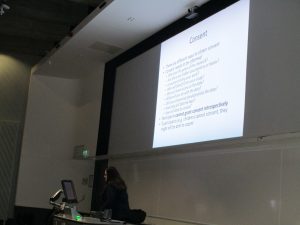
Jana is the ideal person to talk about research ethics, since she is Chair of the College of Humanities Ethics Committee. You can see from her slide that she talked about the importance of getting informed consent from participants in our research.
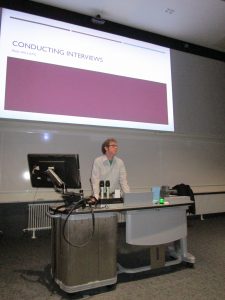
I spoke about how to run interviews: organizing them in advance, learning to be a good listener, and tips on transcribing them afterwards. Based on my own experience I recommend that students avoid interviewing anyone next to a busy road on a windy day in a major city!
So what do the students write about in their dissertations? There is no ‘one-size-fits all’ template for a dissertation; they are as varied as our students’ research interests. To give you an idea, here are some dissertation titles from recent years:
- “Becoming a ‘Conceptual Bastard’: The Relationship Between Visual Culture and the Sexualization of Black Women’s Bodies from Humanism to Posthumanism”
- “‘Beth Redy for to Meete Hym Everemoore’: A Study of Death Personified in Three Medieval Texts”
- “Simile, Difference, and Translation in Christopher Logue’s War Music“
- “Animal Identity, Jungle Ruins and Adapted Environments: Postcolonial Ecocriticism in The Jungle Book(s)“
- Misinterpreting Allegory: Paradise Lost and Its Critics”
- “‘The Stranger Acclimatizes Everyday’: Reconceptualizing Liminality in the Palestinian Context”
- “‘It’s Aggressive But Sometimes You Need to Shout to Get the Point Across’: Grime and ‘Road Rap’ as a Challenge to Postimperial Melancholic Interpretations of the 2011 London Riots”
The dissertation is a challenging endeavour but it gives students the chance to take all the skills and knowledge they have gained over their degree and bring them to bear on a subject that they are passionate about. Within the framework of supervision, workshops, and lectures, they can craft a project that reflects their own interests, and pursuing a self-motivated research project where you have to set yourself targets and deadlines is great experience for whatever you do after your BA degree!
Last but definitely not least, the Department of English & Film at Exeter gives a prize for the undergraduate dissertation that best communicates the qualities of imagination and intellectual flair. Last year this award (the Gamini Salgado Prize) was presented to Rebecca Young for “‘See Her Brain – Go Round’: Emily Dickinson, Neurodiversity and the Matter of the Brain.” Well done Rebecca!
This doesn’t even cover the Creative Writing dissertation – come back later and I’ll tell you all about that too!
